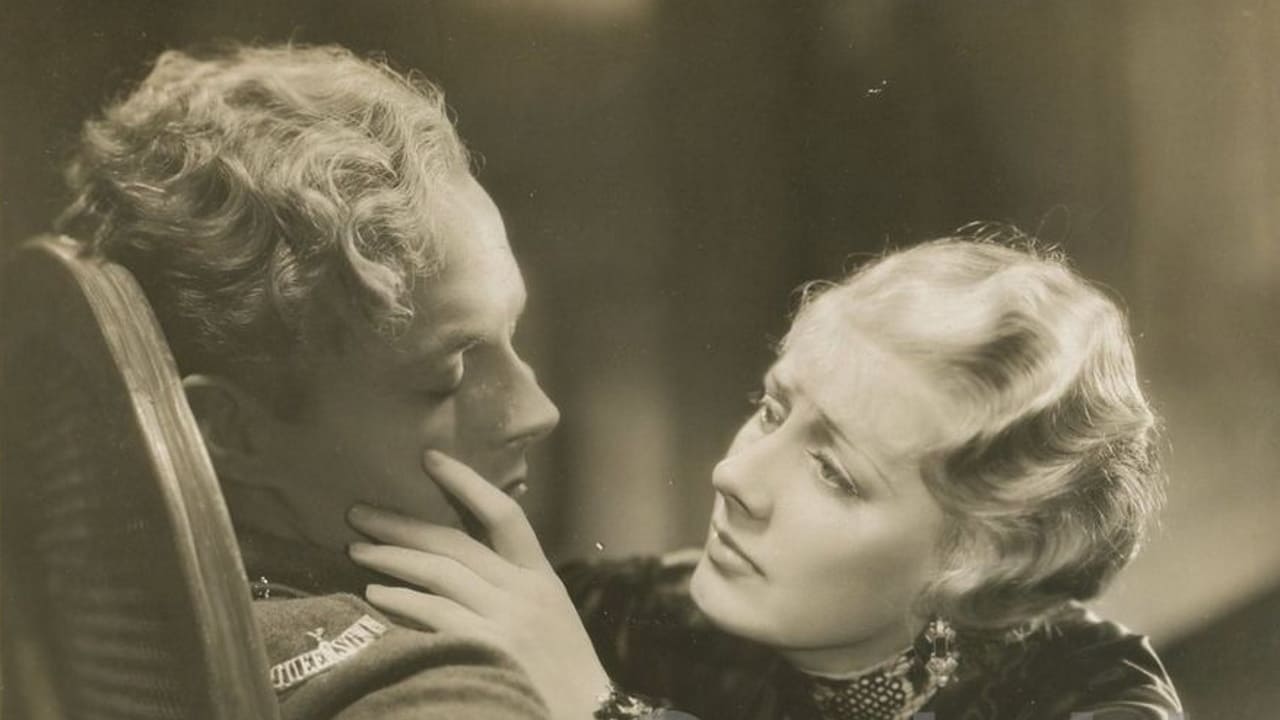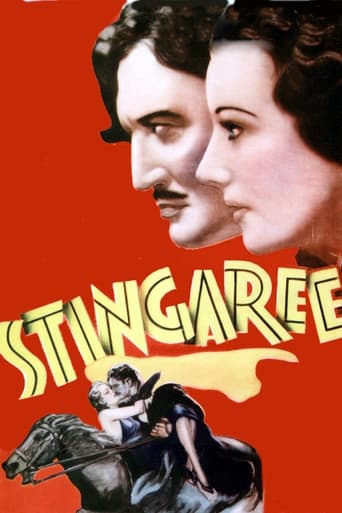

This rare RKO film from their golden age is an above average operetta that only suffers from the casting of its very American and British cast as Australians. Irene Dunne and Richard Dix, reunited from the western epic "Cimarron", play star-crossed lovers, a promising singer and the wanted outlaw she falls in love with. Dunne has been taken in by the outrageously vain Mary Boland who keeps singing whether anybody wants to hear her or not (presumably the latter). You soon realize that every time she starts chirping, "Yo Ho! Yo Ho! Yo Ho!" she's really shouting out of frustration of her lack of discovery. Boland, who played a nag better than anybody in the films of the 30's (just ask Charlie Ruggles' characters who were paired with her in a dozen films), emphasizes this female's phoniness, her constant cheeriness as a total fraud. When Dunne finally has enough and starts imitating this fish-wife, you can see why producers started looking at her for screwball comedies rather than the soap opera she had been playing for several years.Dix, as the titled character, is a bit over the top, his acting more out of a silent film with characteristics that most silent film stars still working in movies in 1934 had gotten rid of. He's also less romantic than the character should be. Andy Devine is always good for a laugh, and there are some good moments for the British Henry Stephenson and Reginald Owen as well. As always, Una O'Connor is a delightful screechy presence, her Irish maid not afraid of putting the boorish Boland in her place.This isn't a film for purists, but as entertainment, it really shines brightly among a few newly discovered "lost" films that even diligent collectors had been searching for over decades.
... View MoreThis is interesting, but not very enjoyable, except for the music, some classics and opera, and an original score by Max Steiner.Beware: The ending reminded me of the last scene of "The Graduate": Two thoughtless people going they knew not where, to survive they knew not how. Dumb! All the performers were superb, but I'm reminded of the cliché, "A thing not worth doing is not worth doing well." The alleged hero is not at all heroic, although courageous enough. He is not at all admirable and one has to wonder why the heroine would fall in love with him.Yes, this is one to see, if you have nothing else to watch, but you won't want to see it again ... except out of horrified wonder.
... View MoreBased on a story by "Raffles" creator E. W. Hornung (brother-in-law of Sir Arthur Conan Doyle), directed by William A. Wellman and promoted as reuniting Irene Dunne (billed first this time) and Richard Dix from the cast of RKO's blockbuster "Cimarron," "Stingaree" is a ridiculous film but also an enjoyable one if you don't take it too seriously. True, it doesn't play to Wellman's strengths as a director (as the awesome, woefully underrated "Safe in Hell" had done a year earlier) or to Irene Dunne's talents as a comedienne, but her singing (her own voice; she was a fully trained operatic mezzo-soprano and had auditioned for the Met before signing with RKO) is gorgeous. Plot-wise this seems like a beta version of a Jeanette MacDonald-Nelson Eddy film all it needed was a male star who could sing (or a voice double for Richard Dix) and though the promise of the first reel that it was going to be "Cimarron" in Australia was not fulfilled, it was still a lot of fun. Incidentally, I wondered if any of it was inspired by the life of real-life diva Nellie Melba, the first international opera star to come from Australia. (There's been at least one other since: Joan Sutherland.)
... View MoreYears ago I wrote a fan letter to Irene Dunne listing several titles that I had seen over the years and enjoyed. She wrote back her favorites were the comedies she made with Cary Grant, MY FAVORITE WIFE & THE AWFUL TRUTH. And that's the singing Irene I like the best AWFUL TRUTH (SHOW BOAT, is a close second! Then ROBERTA and JOY OF LIVING.) And speaking of the awful truth, I don't like STINGEREE. I saw it once because of the director, lead actors and wonderful character actors (still I think the best part of this turkey.) The second time was to give it a second chance, and TCM did run a better print, but the story, script and acting don't mix. It's like a salad dressing that continues to separate, oil on top (that's the opera) and vinegar (that's the western) at the bottom of it all. SPOILERS: Richard Dix plays the title-role, of a highwayman and bandit in 1870's Australia, in this strange mix of swashbuckler and musical. Irene Dunne is Hilda Bouverie, an impoverished serving girl who wants to sing. Left orphaned and homeless by the deaths of her parents, Hilda is now a servant in the home of the Clarksons, the wealthiest family in the province. Hilda is glad to have a roof over her head and three meals a day, but won't really be happy unless she gets a chance to sing, and she has the voice to match her aspirations. Mr. Clarkson (Henry Stephenson) is kind and encouraging enough to her, but his wife (Mary Boland) is a noisy, irritating, no-talent singer who treats Hilda and her other maid Annie (Una O'Connor) as little better than slaves; and Mrs. Clarkson is especially jealous of Hilda, as she also aspires to a singing career, and is eagerly awaiting a visit by London-based composer and impresario Sir Julian Kent (Conway Tearle). And then in rides Stingaree (Richard Dix), a highwayman new to the province, who is already a legend elsewhere in Australia. The authorities, led by the boorish Inspector Radford (George Barraud), know he is there and are set to catch him, but he's smarter than they are and faster on his feet, and outwits them. Stingaree kidnaps Sir Julian and, learning of the Clarksons and their wealth, plans to rob them masquerading as Sir Julian. But when he chances to hear Hilda singing, and gets to meet her, he abandons his plan and, instead, decides to help her his ruse is uncovered, however, and he is forced to flee, and takes the unwilling girl with him. Together in his lair in the forest, Hilda discovers that Stingaree truly does love/lust after her he is a man who takes whatever he wants and wants everything, but, as he tells her, "You are as safe here as you wish to be." Stingaree arranges a daring raid on the Clarkson home that allows Hilda's singing to be heard by Sir Julian the impresario offers her the chance to go to London, and at a career as an opera singer. She's reluctant to accept because Stingaree has been captured, but the highwayman insists that she do it, telling her that he happily gave up his freedom to give Hilda hers. And she conquers the operatic stages of Europe, in a career that takes her to Berlin, the Paris Opera, La Scala, and London's Covent Garden, and leading roles in Trovatore, Martha, and the rest of the major operatic repertory of the period. But she can't forget the sacrifice that Stingaree made for her, or the love they share for each other, and decides that even if it means giving up everything, she must return to Australia to find him. Or at least a point to this rambling and contrived love story...
... View More